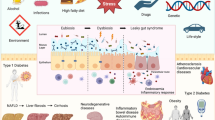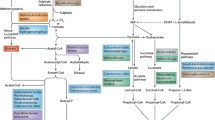Abstract
Antioxidants may protect against the development of esophageal adenocarcinoma. Blood samplesand endoscopic biopsies (squamous, Barrett's, and gastric mucosa) were obtained from 48 Barrett'sesophagus (BE) patients, while 48 age- and sex-matched controls provided blood samples only.Plasma concentrations of vitamins A, C, and E were measured in all subjects, while vitamin C wasmeasured in relation to the type of mucosa. Plasma total vitamin C level, but not vitamin A or E,was lower in BE patients compared to controls ( P = 0.014). Tissue levels of total vitamin C weresignificantly lower in Barrett's compared with squamous mucosa ( P = 0.047). Apositive associationwas observed between plasma vitamin C and dietary intake of vitamin C, while there was an inverseassociation with alcohol consumption. The lower levels of vitamin C in plasma of BE patients andin Barrett's mucosa compared with squamous mucosa are consistent with oxidative stress being ofimportance in the pathogenesis and neoplastic progression of BE.
Similar content being viewed by others
REFERENCES
Wild CP, Hardie LJ: Refux, Barrett's oesophagus and adenocarcinoma: Burning questions. Nature Rev Cancer 3(9): 676–684, 2003
Vizcaino AP, Moreno V, Lambert R, Parkin DM: Time trends incidence of both major histologic types of esophageal carcinomas in selected countries, 1973–1995. Int J Cancer 99: 860–868, 2002
Kabat GC, Ng SK, Wynder EL: Tobacco, alcohol intake, and diet in relation to adenocarcinoma of the esophagus and gastric cardia. Cancer Causes Control 4: 123–132, 1993
Brown LM, Swanson CA, Gridley G, Swanson GM, Schoenberg JB, Greenberg RS, Silverman DT, Pottern LM, Hayers RB, Schwartz AG: Adenocarcinoma of the esophagus: Role of obesity and diet. J Natl Cancer Inst 87: 104–109, 1995
Zhang ZF, Kurtz RC, Yu GP, Sun M, Gargon N, Karpeh M, Jr., Fein JS, Harlap S: Adenocarcinomas of the esophagus and gastric cardia: the role of diet. Nutr Cancer 27: 298–309, 1997
Terry P, Lagergren J, Ye W, Wolk A, Nyren O: Inverse association between intake of cereal fiber and risk of gastric cardia cancer. Gastroenterology 120: 387–391, 2001
Tzonou A, Lipworth L, Garidou A, Signorello LB, Lagiou P, Hsieh C, Trichopoulos D: Diet and risk of esophageal cancer by histologic type in a low-risk population. Int J Cancer 68: 300–304, 1996
Terry P, Lagergren J, Ye W, Nyren O, Wolk A: Antioxidants and cancers of the esophagus and gastric cardia. Int J Cancer 87: 750–754, 2001
Ames BN: DNA damage from micronutrient deficiencies is likely to be a major cause of cancer. Mutat Res 475: 7–20, 2001
Wiseman H, Halliwell B: Damage to DNA by reactive oxygen and nitrogen species: Role in inflammatory disease and progression to cancer. Biochem J 313: 17–29, 1996
Olyaee M, Sontag S, Salman W, Schnell T, Mobarhan S, Eiznhamer D, Keshavarzian A: Mucosal reactive oxygen species production in oesophagitis and Barrett's esophagus. Gut 37: 168–173, 1995
Wetscher GJ, Hinder RA, Bagchi D, Hinder PR, Bagchi M, Perdikis G, McGinn T: Reflux esophagitis in humans is mediated by oxygen-derived free radicals. Am J Surg 170: 552–556, 1995
Wetscher GJ, Hinder RA, Klingler P, Gadenstatter M, Perdikis G, Hinder PR: Reflux esophagitis in humans is a free radical event. Dis Esophagus 10: 29–32, 1997
Wetscher GJ, Perdikis G, Kretchmar DH, Stinson RG, Bagchi D, Redmond EJ, Adrian TE, Hinder RA: Esophagitis in Sprague-Dawley rats is mediated by free radicals. Dig Dis Sci 40: 1297–1305, 1995
Naya MJ, PereBEom D, Ortego J, Alda JO, Lanas A: Superoxide anions produced by inflammatory cells play an important part in the pathogenesis of acid and pepsin induced oesophagitis in rabbits. Gut 40: 175–181, 1997
Sobala GM, Pignatelli B, Schorah CJ, Bartsch H, Sanderson M, Dixon MF, Shires S, King RF, Axon AT: Levels of nitrite, nitrate, N-nitroso compounds, ascorbic acid and total bile acids in gastric juice of patients with and without precancerous conditions of the stomach. Carcinogenesis 12: 193–198, 1991
Waring AJ, Drake IM, Schorah CJ, White KL, Lynch DA, Axon AT, Dixon MF: Ascorbic acid and total vitamin C concentrations in plasma, gastric juice, and gastrointestinal mucosa: effects of gastritis and oral supplementation. Gut 38: 171–176, 1996
Thurnham DI, Smith E, Flora PS: Concurrent liquid-chromatographic assay of retinol, alpha-tocopherol, beta-carotene, alpha-carotene, lycopene, and beta-cryptoxanthin in plasma, with tocopherol acetate as internal standard. Clin Chem 34: 377–381, 1988
Calvert C, Cade J, Barrett JH, Woodhouse A: Using cross-check questions to address the problem of mis-reporting of specific food groups on Food Frequency Questionnaires. UKWCS Steering Group. United Kingdom Women's Cohort Study Steering Group. Eur J Clin Nutr 51: 708–712, 1997
Cerutti PA: Oxyradicals and cancer. Lancet 344: 862–863, 1994
Moller P, Wallin H: Adduct formation, mutagenesis and nucleotide excision repair of DNA damage produced by reactive oxygen species and lipid peroxidation product. Mutat Res 410: 271–290, 1998
Cummings JH, Bingham SA: Diet and the prevention of cancer. BMJ 317: 1636–1640, 1998
Henry E, Wirz A, Mowat C, Fyfe V, McColl KEL: KEL Proton pump inhibitor therapy reduces bioavailability of dietary vitamin C. Gastroenterology 122: S1265, 2002
Loria CM, Whelton PK, Caulfield LE, Szklo M, Klag MJ: Agreement among indicators of vitamin C status. Am J Epidemiol 147: 587–596, 1998
Harris AM, Seal C, Hayes N, Griffin SM: The role of diet in the development of Barrett's esophagus and esophageal adenocarcinoma. Br J Surg 88 (Suppl 1): 30–31, 2001
Gregory J, Foster K, Tyler H, Wiseman M: The National Diet and Nutrition Survey of British Adults. HMSO, London, 1990
Jankowski JA, Harrison RF, Perry I, Balkwill F, Tselepis C: Barrett's metaplasia. Lancet 356: 2079–2085, 2000
Babior BM: Phagocytes and oxidative stress. Am J Med 109: 33–44, 2000
Mamett LJ: Oxyradicals and DNAdamage. Carcinogenesis 21: 361–370, 2000
Halliwell B: Vitamin Cand genomic stability. Mutat Res 475: 29–35, 2001
Loria CM, Klag MJ, Caulfield LE, Whelton PK: Vitamin C status and mortality in US adults. Am J Clin Nutr 72: 139–145, 2000
Lykkesfeldt J, Christen S, Wallock LM, Chang HH, Jacob RA, Ames BN: Ascorbate is depleted by smoking and repleted by moderate supplementation: a study in male smokers and nonsmokers with matched dietary antioxidant intakes. Am J Clin Nutr 71: 530–536, 2000
Olliver JR, Hardie LJ, Dexter S, Chalmers D and Wild CP, DNA damage levels are raised in Barrett's oesophageal mucosa relative to squamous epithelium of the oesophagus. Biomarkers 8: 509–521, 2003
Author information
Authors and Affiliations
Rights and permissions
About this article
Cite this article
Fountoulakis, A., Martin, I.G., White, K.L.M. et al. Plasma and Esophageal Mucosal Levels of Vitamin C: Role in the Pathogenesis and Neoplastic Progression of Barrett's Esophagus. Dig Dis Sci 49, 914–919 (2004). https://doi.org/10.1023/B:DDAS.0000034548.89117.d6
Issue Date:
DOI: https://doi.org/10.1023/B:DDAS.0000034548.89117.d6




